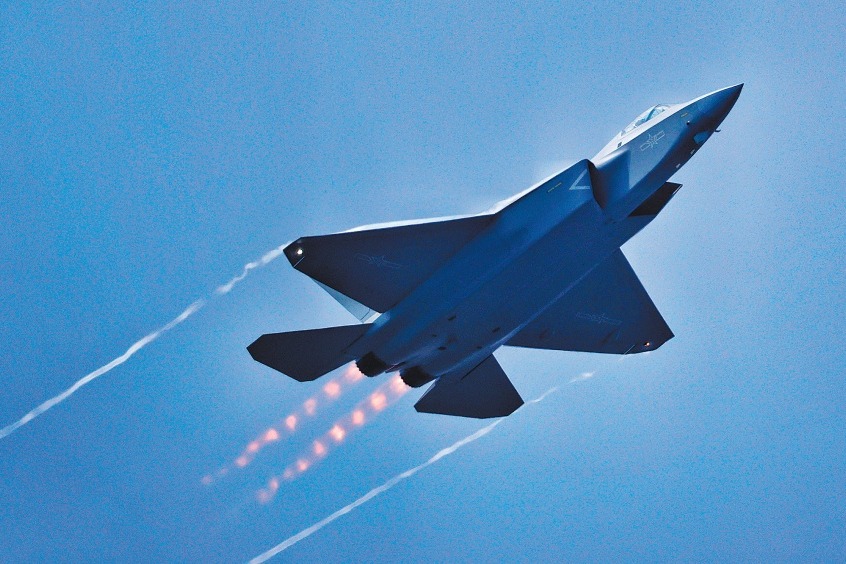US Human Rights Abuse Against Refugees and Immigrants: Truth and Facts
Xinhua | Updated: 2023-03-30 11:50
IV. The United States is the primary cause of the global refugee crisis
◆ The United States follows hegemonic and militaristic policies. Throughout the country's more than 240 years of history, only 16 years were without wars. Former US President Jimmy Carter candidly referred to the United States as "the most warlike nation in the history of the world." The country's aggressive behaviors have led to waves of refugees. Since 2001, US invasions have resulted in over 800,000 deaths and 20 million refugees in Afghanistan, Iraq, Syria and other affected countries. According to a Brown University project entitled "the Costs of War," military operations launched by the United States in 85 countries in the name of "fighting terrorism" since 2001 have costed 6.4 trillion US dollars and claimed more than 929,000 lives. Up to 38 million people were displaced in the fightings.
◆ In Asia, US involvement in the Korean War resulted in over 3 million civilian deaths and around 3 million refugees. The trauma of war persists to this day. Many Korean families were divided because of the long-standing confrontation on the Peninsula. Official data from the ROK alone indicate that the number of people registered as divided family members exceeds 132,000. Many senior citizens worry that to reunite with their families in the DPRK would be too distant a dream in their lifetime. In the 1970s, after losing the Vietnam War, the United States withdrew hastily from Saigon, displacing innumerable refugees out of the country.
◆ In the Middle East, the United States launched the Iraq War based on fabricated evidence in 2003, in the absence of authorization of the UN Security Council and despite strong opposition from the international community. According to Statista, a global database, around 209,000 Iraqi civilians died in the war and ensuing violent conflicts between 2003 and 2021, and around 9.2 million Iraqis became refugees or were forced to leave their homeland. The United States involved itself deeply in the Syrian War and the internal conflict in Libya through multiple proxies, causing prolonged conflicts and leaving political settlement and social stability elusive. According to UN statistics, US military intervention in Syria has left at least 350,000 people dead, 12 million displaced and 14 million in urgent need of humanitarian assistance. The UN refers to the Syrian refugee problem as "the biggest humanitarian and refugee crisis of our time." According to estimates of the UN High Commissioner for Refugees (UNHCR), the war in Afghanistan, which lingered for more than two decades, has forced 2.6 million Afghans to flee the country and displaced 3.5 million.
◆ In Europe, US intervention in the Federal Republic of Yugoslavia in the 1990s escalated ethnic tensions in the country. The wars in Bosnia and Herzegovina and Kosovo resulted in nearly 300,000 deaths and nearly three million refugees. In March 1999, NATO forces led by the United States blatantly bypassed the UN Security Council to carry out a 78-day bombing of Yugoslavia under the pretext of "averting humanitarian disaster," causing over 2,000 civilian deaths, over 6,000 injuries and around a million displaced people.
◆ US military interventions around the world triggered a refugee crisis in Europe. It is widely held in Europe that US interference and military operations in such countries as Afghanistan, Iraq, and Syria gave rise to waves of refugees, but it is Europe, not the United States, that received them. Most of the affected people fled to Europe in the wake of the Syrian refugee crisis, exacerbating anti-immigrant sentiments and right-wing populist movements in Europe. By contrast, the Republican administration in the United States was tough on taking Syrian refugees, bringing refugee admission to a 40-year low and categorically banning refugees from seven Islamic countries from entering the country. The Democratic administration urged the EU to admit some Afghan refugees, a move upsetting the EU which feared that another surge of Muslim refugees could again heighten the right-wing populist movements. French President Emmanuel Macron put it bluntly that Europe alone will not be able to assume the consequences of the current situation in Afghanistan.
◆ In Latin America, long-time US intervention in internal affairs led to instability and economic backwardness in the region. As a result, a large number of refugees and immigrants were forced to seek asylum and livelihood in the United States. To check the flow of immigration from Latin America, the United States forcefully expelled and repatriated refugees and immigrants, and made those attempting to leave stay in their country of origin. The United States' vehement expulsion and repatriation of Latino immigrants exacerbated instability, violent crime and humanitarian crisis in the region. "The United States spent decades contributing to regime change and destabilization in Latin America," criticized Alexandria Ocasio-Cortez, a Democratic member of the US House of Representatives, "We can't help set someone's house on fire and then blame them for fleeing."
◆ The United States and Latin American countries are at loggerheads over immigration and border issues. After being expelled from the United States, refugees and immigrants often become stranded in Mexico, posing a challenge to the country's ability to host and accommodate them and causing public security concerns for the Mexican government. While the United States keeps urging Mexico to do more to prevent its refugees and immigrants and those of other Central American countries from coming to the United States, Mexico blames the surge of refugees and immigrants on the US immigration policy. In recent years, the Northern Triangle of Central America, i.e. Guatemala, El Salvador, and Honduras became the top source of refugees and immigrants to the United States. The US government pressed the governments of the three countries and issued stern warnings to potential immigrants. Its tough stance sparked frustration in Central America and triggered backlash domestically.
◆ The eastward expansion of NATO led by the United States is an important root cause of the Ukraine crisis. Being the initiator and biggest driver of the crisis, the United States cannot shirk off its responsibility for the sufferings of Ukrainian refugees. After the conflict between Russia and Ukraine started, however, the US government suggested that Ukrainian refugees should stay in European countries or return to Ukraine as soon as possible, and was reluctant to take them in on a large scale. As of January 2023, UNHCR data indicated that more than 7.91 million Ukrainian refugees were registered across Europe. It was not until the end of July 2022 that the US government claimed to have received 100,000 Ukrainian refugees, a number significantly dwarfed by Europe Union, and the real purpose of the US move was actually for Ukrainian Americans to reunite with their families.
























